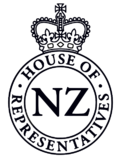| Committee | Subject(s) | Chairperson | Government–Opposition divide |
|---|
| Subject Committees |
|---|
| Economic Development, Science and Innovation Committee | Business development, tourism, Crown minerals, commerce, consumer protection and trading standards, research, science, innovation, intellectual property, broadcasting, communications, and information technology. [12] | Parmjeet Parmar (ACT) | 4–4 |
| Education and Workforce Committee | Education, training, employment, immigration, industrial relations, health and safety, and accident compensation. [13] | Katie Nimon (National) | 5–4 |
| Environment Committee | Conservation, environment, and climate change. [14] | Catherine Wedd (National) | 5–4 |
| Finance and Expenditure Committee | Economic and fiscal policy, taxation, revenue, banking and finance, superannuation, insurance, Government expenditure and financial performance, and public audit. [15] | Cameron Brewer (National) | 6–5 |
| Foreign Affairs, Defence and Trade Committee | Customs, defence, disarmament and arms control, foreign affairs, trade and veterans’ affairs. [16] | Tim van de Molen (National) | 4–3 |
| Governance and Administration Committee | Parliamentary and legislative services, Prime Minister and Cabinet, State services, statistics, internal affairs, civil defence and emergency management, and local government. [17] | Rachel Boyack (Labour) | 4–3 |
| Health Committee | Health. [18] | Sam Uffindell (National) | 5–4 |
| Justice Committee | Constitutional and electoral matters, human rights, justice, courts, crime and criminal law, police, corrections, and Crown legal services. [19] | Hon Andrew Bayly (National) | 6–5 |
| Māori Affairs Committee | Māori affairs and Treaty of Waitangi negotiations. [20] | David MacLeod (National) | 4–4 |
| Parliament Bill Committee | This committee was established by the House to consider and report on the Parliament Bill and any associated business that may be referred to it. The Parliament Bill would consolidate and modernise the four acts that currently relate to the operation of Parliament. | Rt Hon Adrian Rurawhe (Labour) | 4–4 |
| Primary Production Committee | Agriculture, biosecurity, racing, fisheries, productive forestry, lands, and land information. [21] | Mark Cameron (ACT) | 4–3 |
| Social Services and Community Committee | Social development, social housing, income support, women, children, young people, seniors, Pacific peoples, ethnic communities, arts, culture and heritage, sport and recreation, voluntary sector. [22] | Joseph Mooney (National) | 5–4 |
| Transport and Infrastructure Committee | Transport, transport safety, infrastructure, energy, building and construction. [23] | Andy Foster (NZ First) | 4–3 |
| Specialist Committees |
|---|
| Business Committee | Each year it recommends when Parliament meets and when matters are debated (the order of business). It decides who the members of select committees are. It also determines if Parliament meets for extended periods of time (extended settings). [24] | Speaker Rt Hon Gerry Brownlee (National) | 5–4 |
| Intelligence and Security Committee | Looks at business related to New Zealand’s intelligence and security networks. [25] | Prime Minister Rt Hon Christopher Luxon (National) | 4–3 |
| Officers of Parliament Committee | Oversees the officers of Parliament and recommends persons for appointment as officers of Parliament to the House. [26] | Speaker Rt Hon Gerry Brownlee (National) | 5–4 |
| Petitions Committee | Reviews petitions presented to parliament and actions them or forwards them to the relevant committee. | Assistant Speaker Greg O'Connor (Labour) | 2–2 |
| Privileges Committee | Focuses on the rights and freedoms that allow the House of Representatives to do its work and make laws free from outside interference. [27] | Attorney-General Hon Judith Collins (National) | 5–4 |
| Regulations Review Committee | To keep New Zealand running efficiently, law making powers are often given to bodies that are not Parliament. These bodies make rules about common things like ACC fees, industry standards and civil defence responses that can have a nationwide impact. The Committee makes sure that all these rules have been made fairly and are used consistently. [28] | Arena Williams (Labour) | 3–2 |
| Standing Orders Committee | Reviews or considers the rules that govern how the House operates. [29] | Speaker Rt Hon Gerry Brownlee (National) | 5–4 |


